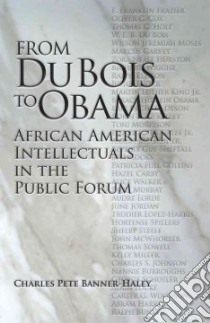From Du Bois to Obama - 9780809329793
Un libro in lingua di Banner haley Charles Pete edito da Southern Illinois Univ Pr, 2010
- € 20.40
- Il prezzo è variabile in funzione del cambio della valuta d’origine
In his groundbreaking new book Charles Pete Banner-Haley explores the history of African American intellectualism and reveals the efforts of black intellectuals in the ongoing struggle against racism, showing how they have responded to Jim Crow segregation, violence against black Americans, and the more subtle racism of the postintegration age. Banner-Haley asserts that African American intellectuals—including academicians, social critics, activists, and writers—serve to generate debate, policy, and change, acting as a moral force to persuade Americans to acknowledge their history of slavery and racism, become more inclusive and accepting of humanity, and take responsibility for social justice.
Other topics addressed in this insightful study include the disconnection over time between black intellectuals and the masses for which they speak; the ways African American intellectuals identify themselves in relation to the larger black community, America as a whole, and the rest of the world; how black intellectuals have gained legitimacy in American society and have accrued moral capital, especially in the area of civil rights; and how that moral capital has been expended. Among the influential figures covered in the book are W. E. B. Du Bois, Ralph Ellison, Richard Wright, James Weldon Johnson, E. Franklin Frazier, Ralph Bunche, Oliver C. Cox, George S. Schuyler, Zora Neale Hurston, Martin Luther King, Jr., Jesse Jackson, Cornel West, Toni Morrison, bell hooks, Charles Johnson, and Barack Obama.
African American intellectuals, as Banner-Haley makes clear, run the political gamut from liberal to conservative. He discusses the emergence of black conservatism, with its accompanying questions about affirmative action, government intervention on behalf of African Americans, and the notion of a color-blind society. He also looks at how popular music—particularly rap and hip-hop—television, movies, cartoons, and other media have functioned as arenas for investigating questions of identity, exploring whether African American intellectuals can also be authentically black.
A concluding discussion of the so-called browning of America, and the subsequent rise in visibility and influence of black intellectuals culminates with the historic election of President Barack Obama, an African American intellectual who has made significant contributions to American society through his books, articles, and speeches. Banner-Haley ponders what Obama's election will mean for the future of race relations and black intellectualism in America.
Informazioni bibliografiche
- Titolo del Libro in lingua: From Du Bois to Obama
- Sottotitolo: African American Intellectuals in the Public Forum
- Lingua: English
- Autori : Banner haley Charles Pete
- Editore: Southern Illinois Univ Pr
- Collana: Southern Illinois Univ Pr (Hardcover)
- Data di Pubblicazione: 16 Giugno '10
- Genere: HISTORY
- Argomenti : African Americans Intellectual life 20th century African Americans Intellectual life 21st century African American intellectuals
- Pagine: 164
- ISBN-10: 0809329794
- EAN-13: 9780809329793


